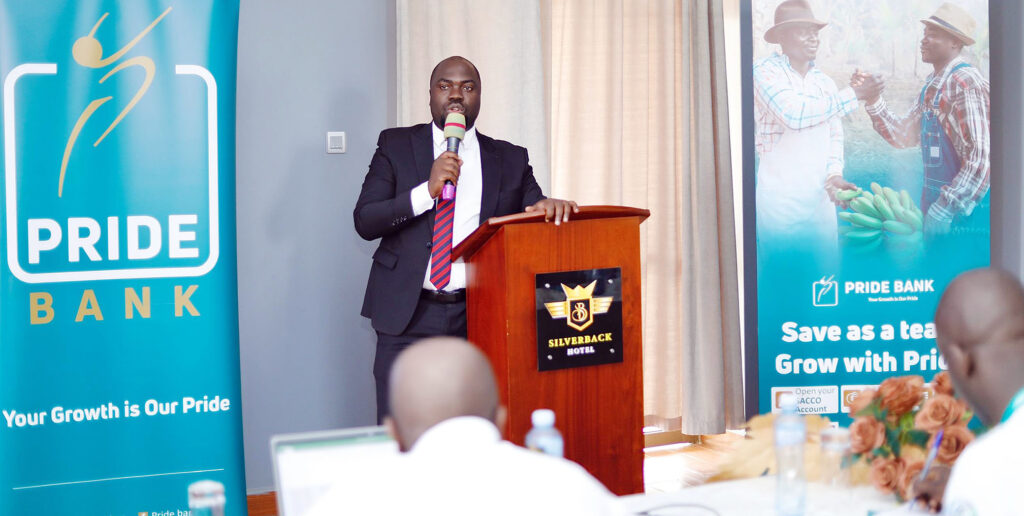MBARARA, UGANDA —In Mbarara City, the launch of a new financial product on Friday didn’t feel like a corporate affair. It felt more like a gathering of neighbors talking about how to make their savings stretch further.
The neighbors in this case were savings groups, SACCOs, village associations, and investment clubs, who form the backbone of Uganda’s grassroots economy. For decades, these groups have helped millions of families pay school fees, buy seeds, or keep small shops alive. Yet their biggest frustration has always been the same: access to credit is limited, informal, and often expensive.
Now Pride Bank Limited, once a microfinance institution and now a fully licensed commercial bank, says it has a solution. The bank has unveiled a SACCO and Investment Club Product designed specifically for these groups, promising not only structured savings and loans but also training and mentorship.
From Small Contributions to Big Ventures
The product works like this: if a group banks consistently with Pride for at least four months, it becomes eligible for loans worth up to 150 percent of what it has saved. That means a SACCO with Shs 10 million in deposits could borrow Shs 15 million to finance a cooperative farm, build rental units, or bulk-purchase inputs for members’ businesses.
“By pooling resources and accessing structured credit, communities can turn small contributions into meaningful ventures,” explained Joseph Feeta, Head of Business at Pride Bank. “Members can collectively build resilience against financial shocks. That directly empowers households, and by extension, the economy.”
It’s an approach rooted in the everyday reality of Ugandan families: many don’t have collateral to secure individual loans, but collectively, in savings groups, they already practice financial discipline.
SACCOs: Uganda’s Quiet Powerhouses
Uganda’s cooperative movement is vast but often overlooked. There are more than 10,000 registered SACCOs across the country, mobilizing billions in savings. Alongside them are thousands of smaller, informal savings groups that reach deeper into villages than any commercial bank branch.
According to the Ministry of Trade, Industry, and Cooperatives, SACCOs today reach more Ugandans than commercial banks do, especially in rural and peri-urban areas. Meanwhile, investment clubs are booming among professionals and youth, pooling resources for real estate, agriculture, and entrepreneurship.
“These groups start small, with 10 or 15 members saving weekly, but they grow into powerful engines of financial literacy and wealth creation,” said Feeta.
Local Leaders See a Timely Boost
At the launch in Mbarara, city leaders were quick to underline the product’s importance.
“Mbarara has long been western Uganda’s hub of commerce,” said Francis Beemanya, Deputy Mayor of Mbarara City. “But many of our community groups still lack the structure and support to scale up. This product gives them a pathway. It is timely, and it can accelerate local economic development.”
For Beemanya, the significance goes beyond finance. It is also about restoring faith in community structures. “People trust their SACCOs and investment clubs. If the bank strengthens those, the entire social fabric benefits,” he added.
A Bank in Transition
The launch is part of Pride Bank’s broader transformation. Formerly Pride Microfinance (MDI), the institution was upgraded in late 2024 to a Tier II bank, a license that allows it to offer a wider range of services. With more than 45 branches nationwide, Pride says it is positioning itself not just as a lender but as a long-term partner for communities.
“Our journey has always been about inclusion,” said Feeta. “Moving from microfinance to banking simply gives us more tools to do that.”
Why It Matters
Uganda has set its sights on achieving middle-income status, but financial exclusion remains a major hurdle. Roughly a third of Ugandans are still outside formal financial systems. SACCOs and savings clubs have been filling that gap, but without structured support, they often hit a ceiling.
By targeting these groups with credit, training, and mentorship, Pride Bank hopes to bridge the space between informal community finance and the formal banking system. Analysts say that if successful, the model could unlock a new wave of small-scale entrepreneurship, particularly among rural women and youth.
The Bigger Picture
What is certain is that Pride Bank’s move signals a growing recognition: development cannot be delivered from the top down. It must be built on the small weekly contributions of women in rural savings circles, the pooled ambitions of youth clubs, and the collective resilience of Uganda’s communities.

